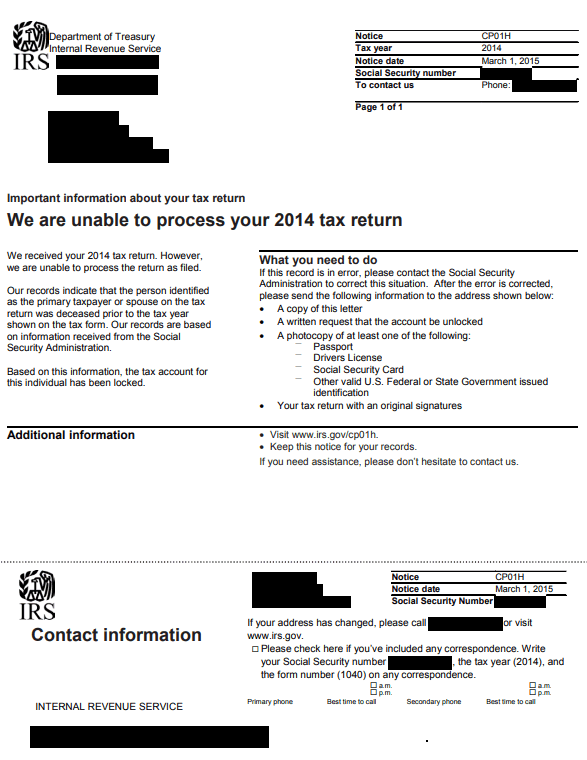What is IRS Notice CP01H and How Should You Respond?
ST
Summary:
The CP01H Notice is a notice from the IRS notifying you that a tax return you submitted contains an SSN from a deceased person. The notice requests that you respond promptly with supporting documentation to confirm your identity and the accuracy of your tax return. It’s important to respond promptly to the notice to avoid any potential penalties or further issues with your tax return.
It’s never fun to receive a letter from the IRS, especially one involving your Social Security number (SSN). But receiving a CP01H Notice from the IRS could actually be helpful. Why?
Keep reading to learn more about the CP01H Notice and what it means for your tax return.
Compare Tax Preparation Services
Compare multiple vetted providers. Discover your best option.
What is the CP01H Notice?
The CP01H Notice is a notice from the Internal Revenue Service (IRS) that’s sent to taxpayers when the IRS receives a tax return that includes the social security number (SSN) of a deceased individual. Of course, this may sound scary, especially if you didn’t do anything different from your former tax filings.
The purpose of the notice is the purpose is to prevent identity theft by locking the account and requiring additional documentation from the taxpayer to confirm their identity and the accuracy of their tax return. The notice requires you to respond to the notice with supporting documentation to confirm your identity and the accuracy of your tax return, such as a driver’s license or passport, and other documents that can verify income like W-2s or 1099s.
The notice may also contain information on how to correct the tax return and any related tax obligations. If you receive IRS Notice CP01H, it’s important to respond promptly to the notice and provide any required documentation to the IRS to avoid any potential penalties or further issues with your tax return.

How to respond to the CP01H Notice
Unlike IRS Notice CP01, you do have to respond to Notice CP01H. If you receive an IRS Notice CP01H stating that your tax return contains the SSN of a deceased individual, here are the steps you should take to respond:
- Confirm the accuracy of the information. Verify that the SSN used on your tax return is correct, belongs to you and that you did not accidentally enter the SSN of a deceased individual.
- Gather supporting documentation. Gather any documentation that can prove your identity. This could include your driver’s license, passport, or birth certificate, and any documents that can support the accuracy of your tax return, such as W-2s, 1099s, or other tax forms.
- Talk to the SSA. To ensure you don’t encounter further issues, talk to the Social Security Administration (SSA) and correct your situation. You can call the SSA’s toll-free number at 1-800-772-1213 or visit a local SSA office.
- Follow instructions. Once you speak with the SSA, follow the instructions listed on your CP01H Notice. Alternatively, you can call the IRS toll-free number listed on the notice and speak with a representative to provide the required information.
- Follow up. Follow up with the IRS to confirm receipt of your response and to ensure that the issue has been resolved.
It’s important to respond promptly to the notice to avoid any potential penalties or further issues with your tax return. Additionally, if you believe that you may be the victim of identity theft, you should take steps to protect yourself, such as monitoring your credit report and placing a fraud alert on your accounts.
FAQS
Why am I getting this notice?
This notice is being sent to you because the IRS isn’t able to process your tax return as filed. According to their records, the primary taxpayer or spouse identified on the return passed away before the tax year displayed on the form.
Since the IRS bases its information on the Social Security Administration, any incorrect information from the SSA will pass on to the IRS. As a precaution to prevent the misuse of this number and potential identity theft, the account was locked.
How do I unlock my account?
In the event that this record is incorrect, please reach out to the SSA to rectify the situation. Once the error has been corrected, please send the following information to the address of the IRS campus where you filed your return:
- A copy of this notice
- A written request to unlock the account
- A photocopy of at least one of the following: passport, driver’s license, social security card, or any other valid U.S. federal or state government-issued identification
- Your tax return with original signatures
Key Takeaways
- IRS Notice CP01H alerts taxpayers when the IRS receives their tax return that includes the SSN of a deceased individual.
- If you receive an IRS Notice CP01H, make sure to respond promptly to the notice. This includes alerting the SSA of the error and providing any required documentation to the IRS to avoid any potential penalties or further issues with your tax return.
- The IRS locks the account to prevent identity theft by the misuse of this number, and the notice may contain information on how to correct the tax return and any related tax obligations.
- If you receive a CP01H Notice, it’s important to take it seriously and respond promptly to avoid any potential penalties or further issues with your tax return. Additionally, if you believe that you may be the victim of identity theft, you should take steps to protect yourself, such as monitoring your credit report and placing a fraud alert on your accounts.
Share this post: